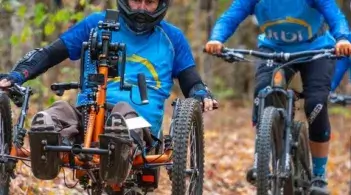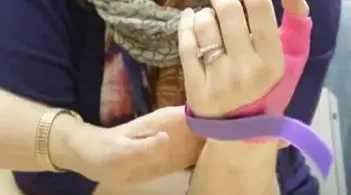Program Overview
UVM's program stands out for its state-of-the-art laboratories, comprehensive embedded fieldwork opportunities, and interprofessional education. A considerable part of this education occurs beyond the conventional classroom environment, offering abundant opportunities for experiential learning within the community.
Earning a degree in occupational therapy empowers you to profoundly influence individuals' lives by assisting them in participating in meaningful activities. Our integrated curriculum prepares you for the realities of patient-centered healthcare, aligns with ACOTE® standards, and qualifies you for the NBCOT exam, laying a solid foundation for a successful career in occupational therapy.
Embark on a rewarding career path where your creativity and empathy can truly make a difference.
Apply to the program
Train with the Latest Technology
Our Smart Apartment lab is outfitted with smart home technology, adaptive technologies, and kitchen and bathroom modifications that offer students and community members various independent living solutions. Furthermore, the facility encourages interdisciplinary cooperation between students of occupational therapy, physical therapy, and speech-language pathology, enhancing interprofessional collaboration and therapeutic outcomes.
Real-World Practice: Hands-On From Day One
We believe the best way to learn is by doing. That’s why from the moment you arrive, the Occupational Therapy Doctorate program immerses you in embedded fieldwork—real clients, real communities, and real impact.
UVM’s unique approach blends classroom learning with hands-on experience. Whether you're working with pediatric clients in a fully equipped therapy space or applying your skills in the local Vermont community, you'll gain the confidence and clinical insight to thrive as a future OT.
Explore the World Through Cultural Immersion
Are you ready to take your occupational therapy education beyond the classroom? UVM’s OTD program offers a transformative Cultural Immersion Course that lets you choose your path—whether it's working with communities locally in Burlington or traveling abroad to places like Belize and Morocco.
These immersive experiences deepen clinical skills, build cultural awareness, and shape compassionate, globally-minded practitioners. From hands-on work in international clinics to meaningful collaborations with local agencies, discover how UVM prepares you to make a real impact—wherever your journey takes you.
Inside Our Simulation Labs
UVM’s state-of-the-art laboratories include the pioneering Pediatric and Design Lab, which fosters children’s self-confidence and vital motor skills essential for daily activities and social engagement. The Smart Apartment Lab features adaptive technologies, smart home systems, and kitchen and bathroom modifications—offering students and community members innovative solutions for independent living.
Learn more about our Smart Apartment Lab in this segment from UVM Extension's television show, Across the Fence.
Graduate Ready to Lead
A considerable part of your education occurs beyond the conventional classroom, with abundant opportunities for experiential learning in the community. Our ACOTE®-aligned curriculum prepares you for the NBCOT exam and a meaningful career in occupational therapy, empowering you to profoundly impact lives by helping individuals participate in the activities that matter most to them.
Accreditation
The University of Vermont’s entry-level occupational therapy doctoral degree program is Accredited by the Accreditation Council for Occupational Therapy Education (ACOTE) of the American Occupational Therapy Association (AOTA), 7501 Wisconsin Avenue, Suite 510E Bethesda, MD 20814. ACOTE's telephone number c/o AOTA is (301) 652-AOTA (2682) or (301) 652-6611, and its web address is www.acoteonline.org.


